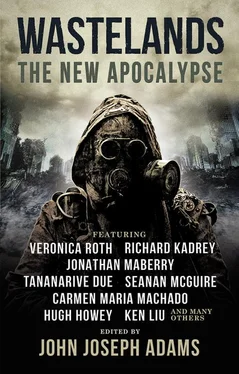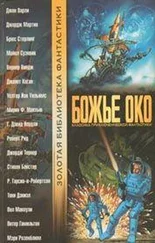You know you’re different, that you somehow in the moments after the blast became something else , but you don’t know why or what. You used to spend long days by the river staring at your reflection, wondering, as your jaw lengthened, your hair receded, your eyes changed color, and your ears grew scaled and long.
It occurs to you that the person with the vehicle might know why. You are not certain you want to know, though, after all this time has passed. You’re not happy, exactly, nor are you sad or worried. But you are calm, and you are balanced. You have few needs. You exist, and you will endure.
You are careful. You aren’t sure that you should risk what you have. What good would knowing do, anyway?
Yet still you follow the tracks carved into the muddy ground as they lead into the forest.
* * *
The trees here grow thick; this is high ground and good soil, so they are ancient. Some of them, the tallest with the thickest trunks, have been here nearly as long as you. You place a fond hand on one as you pass. It is good to endure.
The tracks lead into a clearing ahead. You know there was no clearing there before, and you hide behind one of the huge, old trees to decide what to do next. To endure is good; to risk and perhaps be cut down is wasteful, wrong, and too like the past.
Isn’t it?
You listen. And then you hear a voice.
* * *
You remember voices, and you remember language. You used to talk to yourself, endless streams of thought given voice, but you fell silent long ago. You are not sure what your voice sounds like, or even if you can still use it. You think not in spoken or written language, but in grand pictures and emotions and scenes. To you, God is a flowing river, a bright sun, and life pushing up from beneath the once-tainted ground. God is a bomb, a plague, a shower of rain that stings, a beach choked with bodies and rubble. God is fresh air and putrescence, a fish in the water and the spear that pierces its scaly sides.
But God is not a voice. You listen. You do not know the sounds. You dare to look, and you see movement.
You see the vehicle, narrow and silver and graceful. And beside it, you see yourself.
* * *
But this is not you.
This is like you, but taller, more graceful, and, you think, older. This one has scaled ears, a long jaw, a shining bald scalp, and wide eyes the color of sunset. They are beautiful.
They turn to where you are hiding, and speak.
You want to run. You are careful! This is danger! You must be like the tree, you must endure, you must get away.
But something, some older impulse, some piece of you that existed before the first bomb put the first city to the fire, keeps you rooted where you are.
They walk toward you, and you are afraid.
But you stand your ground. You finger the sharp rock you have. They hold out a webbed hand, so like your own. Your grip tightens on the rock.
They do not move. The trees blow in the breeze. Behind you, the river’s flood begins to recede.
You make a decision. You are not a tree, and you are not a bomb. You drop the rock.
Then you reach out, and at last, after so long, your hand closes on mine.
THE LAST GARDEN
JACK SKILLINGSTEAD
Jack Skillingsteadis the author of the apocalyptic science fiction-thriller The Chaos Function , which was published in March 2019 (John Joseph Adams Books). His novel Harbinger was nominated for a Locus Award for best first novel, and his second, Life on the Preservation , was a finalist for the Philip K. Dick Award. He has published more than forty short stories to critical acclaim and was short-listed for the Theodore Sturgeon Memorial Award. His writing has been translated internationally. He lives in Seattle.
The Surrogate walked past Casey’s window. She watched its shadow slip across the shade, then she stood and zipped up her flight suit. This was the day. No matter what.
The doorbell rang.
It was polite, the Surrogate. It had manners. It rang the doorbell. It said please and thank you. It had saved Casey’s life, twice, and the first time she had been grateful.
Casey bit her lip hard enough to hurt. The pain helped her focus on her mission. Because sometimes she didn’t believe in it. Sometimes she was weak and disloyal to her own kind. That was understandable, considering her own kind, the human race, on Earth at least, was an extinct species. What was there to be loyal to ?
The embryos. The cloned embryos in cryostasis.
Her mother.
Twenty-six months ago, Casey and her nine crewmates had watched helplessly from orbit while a plague wiped out humanity with the brutal efficiency of a worldwide tsunami. The final message sent from Washington to all orbiting spacecraft said simply, “Don’t come down.” But Casey and her crew had no choice. Without re-supply vehicles, they couldn’t remain in space. Meanwhile, arguments raged on the Lunar colony, which was self-sustaining. Those in favor of staying put seemed to be winning. Then all communication coming from the Moon ceased.
The polite Surrogate rang the bell again. It claimed to worry about her, like a parent. But it couldn’t really be worried about her. The Surrogate was a machine, a top-secret military-grade AI, from when there had been both a military and anything secret.
Casey stood in the entry, arms folded, feet planted on the vinyl floor. Military housing, drab and cheap. When she was a child in Virginia, Casey had lived with her mother in a big house with white columns in front. She remembered her mother pulling her down the dappled sidewalk in a red wagon, remembered the sound of the hard rubber wheels rolling on pavement. It was funny how that memory stood out but later ones had folded away into the dark. It was like peering down a long tube to a vision drenched in sunlight.
The knob turned, encountered the lock, turned harder until the lock broke and the door splintered away from the jamb.
The Surrogate had a paint-can head, eyes that glowed blue, and a slot mouth. The sturdy torso contained the power source. A flexible spine, like a length of knuckled bike chain, attached the torso to a pair of ingeniously swiveling hips. The legs were like attenuated cages made from carbon rods.
When Casey and her crewmates descended from orbit in two vehicles, automated defenses had immediately attacked them, destroying one vehicle outright and severely damaging the other. Casey managed a hard landing in the high desert of New Mexico near Tourangeau Air Base. Only Casey survived. Pinned inside the wreckage, her leg broken, she had expected to die of plague. The microbes, however, had all perished as soon as no humans were left to host them, and Casey had returned to consciousness and a world of bright pain in time to see the robot Surrogate peel away a flange of the damaged hull and reach for her.
Now Casey had let the Surrogate break open the door of the house. She hoped the destruction would make her angry at the robot, instead of frightened by what she was planning. She needed the anger.
“You didn’t answer, Casey Stillman,” the Surrogate said. “Our agreement was that you would answer.”
“I know that.” Casey’s voice broke. She wiped her eyes roughly. It was the stupid door, wood splintered and hanging there on bent hinges, like a memory of things unbroken that were now broken forever. Instead of producing anger, it lifted the cover off a deep well of sadness. For months after the crash, she had combed the internet and the airwaves, desperate for contact. But if anyone had survived, they were unable to communicate. During those same months, the Surrogate had nursed Casey, waited on and bonded with her—as it was programmed to do.
Читать дальше


![Nick Cracknell - The Quiet Apocalypse [= Island Zero]](/books/28041/nick-cracknell-the-quiet-apocalypse-island-zero-thumb.webp)









